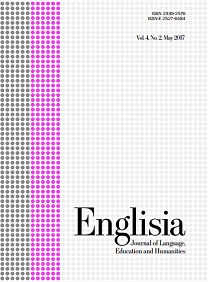Exploring ecolinguistics: A new paradigm for tourism English learning
DOI:
https://doi.org/10.22373/ej.v12i2.27648Abstract
This study investigates the integration of ecolinguistic principles into English language instruction for tourism students to enhance their environmental awareness and communication skills. Employing a qualitative approach, the research involved 29 tourism students at the Denpasar Academy of Tourism in Indonesia. Data were gathered through a practical adventure tour activity and individual interviews. The findings reveal that ecolinguistic strategies significantly improved students’ use of environment-related vocabulary, increased their confidence in discussing ecological issues in English, and cultivated a stronger sense of environmental responsibility. The study suggests that embedding ecolinguistics in English tourism education equips future professionals with the linguistic tools to promote sustainability in the tourism industry.Downloads
References
Achmad, S. (2012). Pelatihan kepariwisataan dan bahasa Inggris praktis bagi remaja dan praktisi pariwisata pantai Olele kecamatan Kabila Bone Kabupaten Bone Bolangol. Pengabdian Masyarakat-PNBP.
Al-Malki, E. A. A., Javid, C. Z., Farooq, M. U., Algethami, G. F., & Al-Harthi, A. A. (2022). Analysis of the English language needs of the Saudi tourism workforce: A first step into designing ESP teaching materials. International Journal of Learning, Teaching and Educational Research, 21(2), 72–88.
Arifin, M., Abrar, A., & Supriyadi, S. (2024). Peningkatan Kemampuan English for Tourism bagi Pemuda Desa Karang Bongkot untuk Menghadapi Program the Best Halal Tourism Nusa Tenggara Barat. Ibrah: Jurnal Pengabdian Kepada Masyarakat, 3(1), 12–23.
Bungin, B. (2003). Analisis Data Kualitatif. Penerbit PT Raja Grafindo Persada, Jakarta.
Doron Helen English. (2023). Eco-Linguistics: Learning English and Caring for the Environment. Article. https://helendoron.com/english/eco-linguistics-learning-english-and-caring-for-the-environment/
Fill, A., & Muhlhausler, P. (Eds.). (2001). The ecolinguistic Reader: Language, Ecology and Environment (1st ed.). Continuum.
Hariati, P., Saragih, A., & Husein, R. (2022). Ecolinguistics Studies For Naming ObjectsIn Bukit Lawang Tourism. Journal of Positive School Psychology, 6(8), 9566–9589.
Hulu, F., Saragih, S. P., & Afridola, S. (2019). Pelatihan Bahasa Inggris untuk Pariwisata di Kampung Pulau Akar, Batam. SABDAMAS, 1(1), 278–283.
Kramsch, C., & Vork Steffensen, S. (2008). Ecological Perspectives on Second Language Acquisition and Socialization BT - Encyclopedia of Language and Education (N. H. Hornberger (Ed.); pp. 2595–2606). Springer US. https://doi.org/10.1007/978-0-387-30424-3_194
Liu Zhipeng. (2023). English Language Teaching Based on Ecolinguistics. CSCanada Studies in Literature and Language, 27(2), 1–5. http://www.cscanada.net/index.php/sll/article/view/13152 DOI: http://dx.doi.org/10.3968/13152 1.
Mühlhäusler, P. (2002). Linguistic ecology: Language change and linguistic imperialism in the Pacific region. Routledge.
Mühlhäusler, P. (2003). Language of environment, environment of language: a course in ecolinguistics. Battlebridge Publications.
Novawan, A., Alvarez-Tosalem, S. M. P., Walker, S. A., Ismailia, T., & Budi, A. S. (2022). Reframing Language Education in the Light of Ecological Linguistics Is the Ecological Perspective “Toxic” or “Vitamin”? Proceedings of the 2nd International Conference on Social Science, Humanity and Public Health (ICOSHIP 2021), 1–10.
Phys.org. (2024). The new ecolinguistics: A vision for the future of language learning. Article. https://phys.org/news/2024-11-ecolinguistics-vision-future-language.html#google_vignette
Pratiwi, A. A. M., & Kesumadewi, P. D. (2022). Pelatihan Praktik Bahasa Inggris Di Bidang Pariwisata (English For Tourism) Bagi Siswa SMKN Jurusan Pariwisata Di Kota Denpasar. Jurnal Dharma Jnana, 2(3), 255–262.
Prima, S. (2022). A study of perception of the importance of English language skills among Indonesian hotel employees. J-SHMIC: Journal of English for Academic, 9(1), 73–86.
Steffensen, S. V., & Fill, A. (2014). Ecolinguistics: The ecology of language and science: Special Issue of Language Sciences. London: Pure Print.
Stibbe, A. (2015). Ecolinguistics: Language, ecology and the stories we live by. Routledge.
Supatmiwati, D., Suktiningsih, W., Sutarman, S., Abdussamad, Z., & Muhid, A. (2021). An Ecolinguistic Study on Ecospiritual Tourism of Rebo Buntung Commoddification. Lingua Cultura, 15(2), 183–189.
Wikipedia. (2024). Ecolinguistics. Article. https://en.wikipedia.org/wiki/Ecolinguistics
Zheng, D., Cowley, S. J., & Nuesser, M. (2024). The New Ecolinguistics: Learning as Languaging with Digital Technologies. Frontiers of Digital Education, 1(1), 109–119. https://doi.org/10.1007/s44366-024-0026-7
Downloads
Published
Issue
Section
License
Copyright (c) 2025 I Gede Astawa

This work is licensed under a Creative Commons Attribution 4.0 International License.
Proposed Policy for Journals That Offer Open Access
Authors who publish with Englisia journal agree to the following terms:
- Authors retain copyright and grant the journal right of first publication with the work simultaneously licensed under a Creative Commons Attribution License that allows others to share the work with an acknowledgement of the work's authorship and initial publication in this journal.
- Authors are able to enter into separate, additional contractual arrangements for the non-exclusive distribution of the journal's published version of the work (e.g., post it to an institutional repository or publish it in a book), with an acknowledgement of its initial publication in this journal.
- Authors are permitted and encouraged to post their work online (e.g., in institutional repositories or on their website) prior to and during the submission process, as it can lead to productive exchanges, as well as earlier and greater citation of published work (See The Effect of Open Access).









